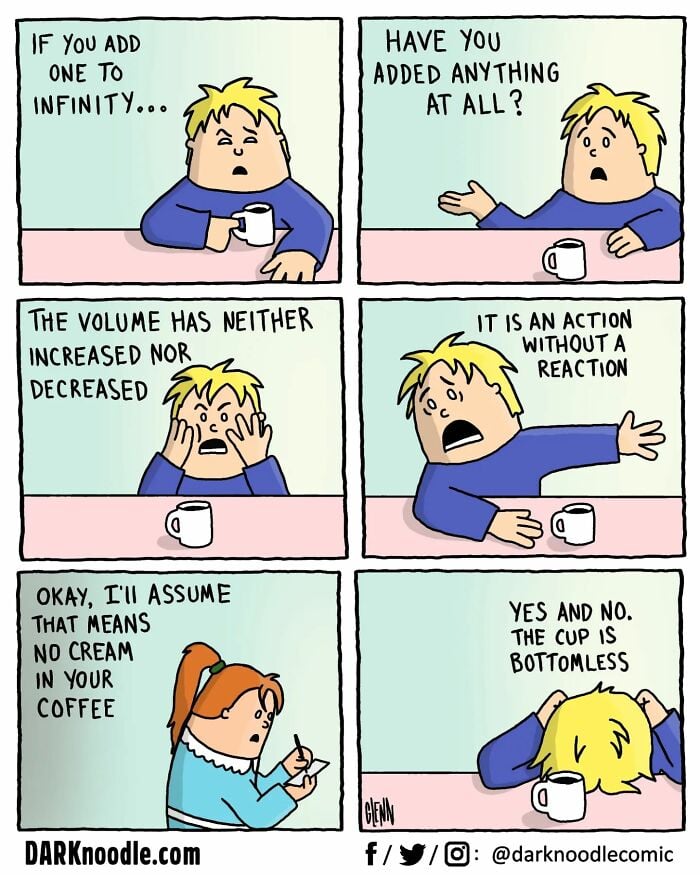this post was submitted on 10 Jan 2025
377 points (97.0% liked)
Comic Strips
13114 readers
3203 users here now
Comic Strips is a community for those who love comic stories.
The rules are simple:
- The post can be a single image, an image gallery, or a link to a specific comic hosted on another site (the author's website, for instance).
- The comic must be a complete story.
- If it is an external link, it must be to a specific story, not to the root of the site.
- You may post comics from others or your own.
- If you are posting a comic of your own, a maximum of one per week is allowed (I know, your comics are great, but this rule helps avoid spam).
- The comic can be in any language, but if it's not in English, OP must include an English translation in the post's 'body' field (note: you don't need to select a specific language when posting a comic).
- Politeness.
- Adult content is not allowed. This community aims to be fun for people of all ages.
Web of links
- !linuxmemes@lemmy.world: "I use Arch btw"
- !memes@lemmy.world: memes (you don't say!)
founded 2 years ago
MODERATORS
you are viewing a single comment's thread
view the rest of the comments
view the rest of the comments

TL;DR you can't use infinity like that and your calculus professor will yell at you if you try.
Infinity isn't a real number and it's not generally useful to think of it as one like the dude in this comic is trying to. However, in calculus you can treat it as a concept that a variable or expression can approach. In that way, "approaching infinity" is just another way of saying "increasing forever" or "given a number x, you can always use x+1". This is why expressions like “infinity = infinity" or "infinity = infinity+1" like the comic are not useful statements.
That's also why your calculus professor is so insistent that you write out the whole limit notation, because it's nonsense to just throw infinity into an expression raw (like "infinity+1" in the comic). But, if you think of it as "the limit of x+1, where x approaches infinity", then it's clear that infinity doesn't have anything to do with the actual values, it's just used to describe potential values.
Here's an example if that still doesn't make sense: Bob and Jill are twins who were born with 0 and 1 dollars respectfully, but both earn a dollar a day forever because they're immortal. Just because they will live forever, doesn't mean that they'll ever be able to say "I'm infinite years old". They'll always be x years old, but x will increase by one every year from their birthday for the rest of time. For the same reasons, they'll never be able to say "I have infinite money", but if they don't spend it, it will increase forever, approaching infinity. And finally, if neither Bob or Jill spends anything and that dollar a day is their only income, then Jill will always be worth a dollar more than Bob, even though both have infinite wealth potential.
the concept of infinity + 1 can be rigorously defined (as an ordinal number). the basic idea is that infinity +1 is the set containing every single positive whole number, in increasing order, and then something else.
but what you said about infinity in calculus is correct. the “infinity” that appears in calculus is conceptually a different idea of infinity and it’s basically just an inconvenient choice of notation that they’re called the same thing.
in complex analysis, there’s also the riemann sphere, which is basically a way to view the sphere as the complex plane in addition to the “point at infinity”. i.e., 0 is the south pole, and infinity is the north pole. and in this context it’s fairly common to say stuff like “f(infinity) = 0” or “f(2) = infinity”. these can all be understood in terms of limits as you described, but it does sort of blur the line between “actual value” and “potential value”, since infinity is actually a point in the riemann sphere, but it’s primarily described in terms of limits.